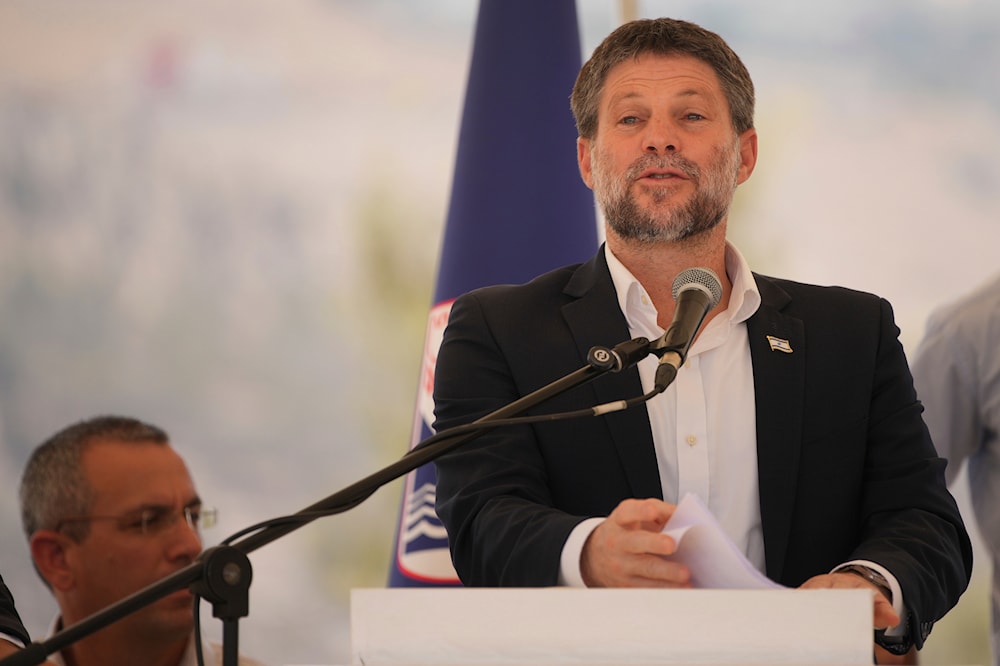Israelis divided over Trump-backed Gaza ceasefire deal
Israeli leaders express divided views over the Gaza ceasefire, as Netanyahu's closest allies defend the deal while far-right ministers threaten its collapse.
-

Israeli Finance Minister Bezalel Smotrich speaks to journalists during a press conference about new illegal settlement construction in the occupied West Bank, occupied Palestine, on August 14, 2025. (AP)
Israeli leaders are expressing sharply differing positions on the Gaza ceasefire agreement, which builds on a 20-point proposal led by United States President Donald Trump and supported by Prime Minister Benjamin Netanyahu and Strategic Affairs Minister Ron Dermer.
The agreement, which includes the release of Palestinian prisoners and detainees in exchange for Israeli captives, a halt to fighting in Gaza, and Israeli withdrawal, has again exposed deep political rifts within Netanyahu’s coalition as he continues to face ongoing corruption trials.
Levin backs Netanyahu
Justice Minister Yariv Levin, a key Netanyahu ally, praised the deal in an Instagram post, highlighting the return of captives.
Levin thanked Netanyahu, "who led the ship in its difficult moments and brought us to the historic moment in which we are now." He also thanked Trump for his role in bringing the agreement forward.
"The agreement includes tough prices," Levin admitted.
He said that releasing Palestinian prisoners is a "very high price."
"We will continue to work to ensure that Hamas never takes arms and control of the Gaza Strip again," he added.
An Israeli media outlet highlighted a notable shift in government rhetoric, moving from calls for the complete eradication of the Palestinian Resistance movement Hamas to now advocating for its disarmament.
However, Hamas has not publicly endorsed the full scope of Trump’s plan, indicating that the recently agreed deal pertains only to a prisoner exchange and a temporary ceasefire. The group has emphasized that broader issues, including governance and other national matters, must be resolved collectively by all Palestinian factions through inclusive national discussions.
Read more: Hamas rejects fabricated reports on its disarmament stance
Smotrich threatens deal's completion
Far-right leader and Finance Minister Bezalel Smotrich voiced strong opposition to the deal, citing security concerns over the release of Palestinian prisoners.
"While I feel immense joy at the pending return of the hostages, I feel tremendous fear of the consequences of emptying the prisons and releasing the next generation of terrorist leaders," the sanctioned minister said.
"We cannot join in the short-sighted celebrations or vote in favor of the deal," he emphasized.
He insisted that "Israel" must continue operations against Hamas after the captives are freed. Smotrich also rejected elements of the US plan calling for international guarantees or steps toward Palestinian statehood, framing them as a return to failed Israeli policies.
Settlements Minister Orit Strock, a party ally, added that remaining in a government she sees as compromising on security and territorial goals is "morally impossible".
"[I don’t] know how it’s morally possible to remain in a government that does Oslo III, sends soldiers to fight and says — we gave up on these goals," she told Israeli news website Ynet.
Read more: After 2 yrs. of genocide, Gaza deal backed regionally, internationally
Lapid, Bennett praise Trump’s mediation
Opposition figures expressed gratitude for the international mediation.
Yair Lapid said, "I congratulate President Trump. There is no person who deserves more the Nobel Peace Prize — and more than that, the eternal gratitude of the people of Israel."
"I congratulate Prime Minister Netanyahu, the commanders and soldiers of the IDF, and above all, the families of the hostages," the Israeli opposition Leader said.
Former Prime Minister Naftali Bennett similarly expressed gratitude for Trump’s involvement.
"I wish to thank President Trump for his unprecedented involvement," he underscored.
Read more: Trump’s Gaza plan met with deep doubt by Palestinian Americans
Israeli media weighs in on ceasefire deal
Meanwhile, Israeli analysts have voiced contrasting reflections on the outcome of the latest Gaza ceasefire agreement, highlighting both the perceived successes of American mediation and the underlying uncertainties facing "Israel’s" future strategy toward Hamas.
Baruch Yedid: Hamas achieves victory
Israeli commentator Baruch Yedid noted that the release of 250 Palestinian detainees marks a significant development reminiscent of the 2011 exchange deal that freed over 1,000 prisoners. Yedid observed that at the time, “we did not know to mark Sinwar,” referring to martyred Palestinian Resistance leader Yahya Sinwar’s rise from among the freed prisoners to leading Hamas.
He argued that Hamas has succeeded in fulfilling its promise to "empty the prisons," yet the extent of its continued rule in Gaza remains uncertain. According to Yedid, Hamas’ leadership is securing its future under the sponsorship of Turkey and Qatar, two states that have strengthened their ties with the US amid the ongoing mediation process.
Read more: Trump to give speech in Israeli Knesset, says Gaza phase 1 agreed on
Issacharoff: Trump’s mediation delivers partial wins for both sides
Israeli journalist Avi Issacharoff described the ceasefire as a diplomatic milestone achieved through sustained American mediation, crediting Trump’s team for seeing the process through.
He wrote in an article for Ynet that “both sides can claim they won,” even though neither achieved all of their objectives.
Issacharoff pointed out that the Israeli government under Netanyahu succeeded in securing the release of all living captives and several bodies of captives without a full withdrawal from the Gaza Strip. The Israeli occupation forces, he noted, continue to occupy about 53% of the enclave, maintaining a “thick security perimeter” to prevent future attacks.
On the other hand, Hamas, he said, gained international recognition, a cessation of hostilities, and likely guarantees preventing renewed Israeli attacks during ongoing negotiations. The movement is also expected to receive international aid to rehabilitate Gaza and restore its administrative authority.
Issacharoff added that the turning point in the US position came after "Israel" reportedly targeted Hamas leaders in Doha during high-level discussions, a move that prompted Washington to pressure Tel Aviv into halting the war.
Read more: 'Israel' resumes aggression on Gaza despite ceasefire announcement

 6 Min Read
6 Min Read











